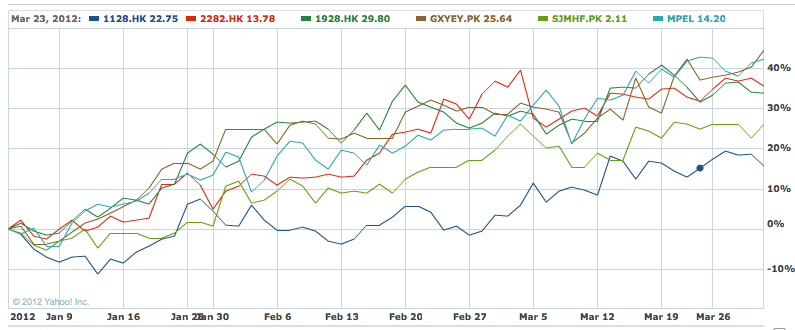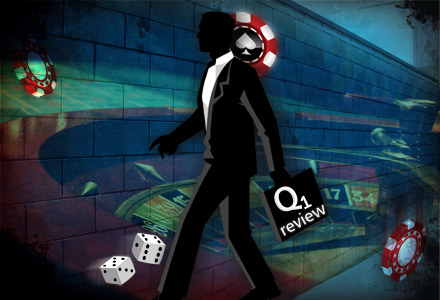The first quarter was kind to equity markets worldwide, with double-digit rises seen around the world. Gambling stocks benefitted as well, as the Market Vectors Gaming ETF (BJK), comprised of 52 industry stocks worldwide, rose 16% in the year’s first three months. The main catalyst was rising optimism toward the global economy, which boosted valuations across the gambling sector.
Within the sector, however, there were a number of themes that moved valuations – some covered here in my column and some to keep an eye on in the future. As we move into April, and toward the beginning of another round of corporate earnings, a review of the first quarter’s key developments in gambling stocks, and what they mean for investors going forward.
Macau, baby.
Shares in publicly traded operators on the Chinese island of Macau boomed, as growth in the enclave continued to impress; gambling revenues rose 27% year-over-year in the first quarter. Shares in all six of the island’s casinos rose sharply in the quarter:

First quarter chart of Galaxy Entertainment (27.HK); MGM China (2282.HK); Sands China (1928.HK); Wynn Macau (1128.HK); SJM Holdings (880.HK); Melco Crown Entertainment (MPEL) in aqua.
Even laggard Wynn Macau – facing concerns about the company’s weak market share in Macau – saw a rise greater than that of the global industry at large, while its competitors saw returns between 26 and 43 percent for the quarter. This is nothing new, of course; with the exception of MGM China (which has been roughly flat since going public in the summer of 2011), each of the Macau-facing operators have seen gains of at least 90 percent over the last two years, with leader Galaxy up over 400% since April 2010. With the island continuing to defy skepticism about a “hard landing” on the Chinese mainland and a corresponding slowdown in gambling, the stocks may have further yet to run.
Strength in Macau also boosted the share prices of US operators with substantial stakes in Macau subsidiaries: Wynn Resorts (WYNN), MGM Resorts International (MGM), and Las Vegas Sands (LVS). LVS led the way with a 30% return; MGM rose 24%, while WYNN, beset by the feud between founder Steve Wynn and shareholder Kazuo Okada and fears that its position in Macau is eroding, rose just 10% for the quarter. (Guess which one of the three I recommended back in January.)
Despite the strength in the US-listed stocks, all three lagged the returns of their Macau-based, Hong Kong-listed subsidiaries. As I noted in my piece on pairs trades last month, the opportunity still exists for investors to bet on the strength of Macau by buying stock in the Asian subsidiaries and shorting the US-listed parents. For the quarter, those trades would have returned 6%, 3%, and 2%, for MGM (my favorite of the three), Wynn, and Las Vegas Sands, respectively. Those returns would have lagged the market, of course; but the lower-risk nature of the pairs trade makes it still worth a look going forward.
Beyond the casino operators, investors can look to “junket” companies to play Macau’s growth. I recommended VIP room operator Asia Entertainment and Resources (AERL) back in January; the stock has risen slightly since I covered it but, at Friday’s close of $6.10, still looks undervalued.
Macau isn’t the only market in Asia.
Despite the gaudy numbers and impressive growth, Macau is not the only booming market in Asia. In 2011, LVS made almost as much profit from its Marina Bay Sands property in Singapore as it did in the better-known Macau market. Smaller, emerging markets such as Korea and even Cambodia offer opportunities as well. In March, I covered stocks in both countries. Paradise Co Ltd. (034230.KS) and Grand Korea Leisure (114090.KS), which dominate the “foreigners-only” market in South Korea, both rose modestly in the quarter. Both stocks still appear to have some upside, though both bear the standard risks of emerging-market and gambling sector stocks.
The other company profiled in that piece was Cambodia’s NagaCorp (3918.HK), which had a far more interesting quarter. On March 9th, the stock rose to HK$4.01, having risen 90% since the start of the year. It started to fade from there, and a week later I noted that the stock was still above the target prices set by the analysts covering the company. The stock continued to struggle, until announcing this week that it would sell an additional 214 million shares between $3.04 and $3.18 per share. The stock fell sharply, and closed Friday at HK$2.99, down over 25% in less than a month. “Should the stock pull back, it would be an interesting – and no doubt exciting – play on the Asian gambling market,” I wrote back in March. The 25% decline offers a far more reasonable entry point, and the stock’s roller coaster first quarter proves that owning NagaCorp will definitely be interesting – at the least.
The US online poker “gold rush” is on, but investors have been shut out.
The late December, opinion from the US Department of Justice sparked a short-term rush into gambling stocks. But, as I noted in my first piece for CalvinAyre.com, much of the euphoria subsided rather quickly, at least in the stock market. Stocks such as Boyd Gaming (BYD) and tiny PokerTek (PTEK) gave back their gains within weeks; European online gambling providers 888 Holdings (888.L) and Bwin.party Digital Entertainment (BPTY.L) – both of whom have joint ventures with licensed US operators – saw initial spikes, then flattened out in January.
 BPTY actually finished down about 7% for the quarter, despite a reasonably positive 2011 earnings report in late March. Of note, however; poker revenue actually declined year-over-year, showing the headwinds in the mature European online poker market and perhaps adding a much-needed dose of skepticism toward the potential of the still-apocryphal US market.
BPTY actually finished down about 7% for the quarter, despite a reasonably positive 2011 earnings report in late March. Of note, however; poker revenue actually declined year-over-year, showing the headwinds in the mature European online poker market and perhaps adding a much-needed dose of skepticism toward the potential of the still-apocryphal US market.
888, on the other hand, had an excellent quarter, rising nearly 50% after strong year-end earnings showed revenue growth of 26% and a doubling of pre-tax earnings. According to the company’s annual report, 888 moved from 13th to fourth in poker traffic during the year, meaning that Pwin’s loss appears to be 888’s gain. Still, other than two big moves – first when the company pre-announced strong 2011 revenue figures in late January, and then again in late March when profit figures were revealed – 888 stock largely stayed flat, despite the rising broad market in Europe. Combined with BPTY’s lack of movement, it appears investors are still taking a “wait-and-see” approach to the US online gambling market. Outside of earnings, the stocks basically did not move. It appears, as I argued back in February, the regulatory and political atmosphere surrounding online gambling is so volatile and so confusing that investors are almost paralyzed.
Industry insiders, however, are not. The quarter saw a flurry of activity as industry players raced to stake their claim in the online poker “gold rush”. Slot maker Bally Technologies (BYI) introduced new server technology for online gambling, while industry leader International Game Technology (IGT) bought Facebook game developer Double Down Interactive for $500 million. IGT may now compete with Zynga (ZNGA), whose COO has discussed the social media company’s interest in the online gambling space. Churchill Downs (CHDN) purchased Bluff Media in advance of “the liberalization of state or federal laws with respect to Internet poker in the United States.”
The problem for investors, however, is that the deals have all involved small, privately held companies. The avenues for investment in the online gambling space are primarily stocks like ZNGA, BPTY and 888, all of which have substantial risk beyond US Internet poker. Meanwhile, the expenditures by existing operators and suppliers can affect share prices; IGT had a lackluster, slightly negative first quarter due to weak December quarter earnings and perception that the company overpaid for Double Down. While Internet poker is a hot topic in the gambling industry, for gambling investors, it has so far been much ado about nothing.
There are some serious challenges for regional US casino operators.
Despite the run-up in the broad market, and in the gambling sector, regional US casino stocks lagged. Other than Isle of Capri (ISLE), which rose nearly 50% (one of the reasons I suggested shorting that stock three weeks ago), US operators stagnated. Penn National Gaming (PENN) rose in line with the broad market at 12.8%, but competitors Pinnacle Entertainment (PNK), Boyd Gaming (BYD), and Ameristar Casinos (ASCA) rose just 6.3%, 2.0% and 5.0%, respectively.
I have been notably bearish on this group of companies, recommending them as a short play in a pairs trade with Macau-facing operators such as WYNN or LVS, and noting the political and competitive challenges facing the highly-regulated business. But the weak first quarter performance may signal tough times ahead for these stocks. Gambling stocks are highly correlated with economic expectations, but they are also volatile. Casino stocks should rise faster than the overall market in the good times – because they often fall further when fear returns to the market, and the highly leveraged, economically sensitive casino business falls out of favor. The fact that higher-risk sectors such as semiconductors and housing saw above-average returns in the first quarter, while casino stocks were left behind, is a bad omen for US casino operators. The lack of enthusiasm for these stocks in a market environment where similarly high-risk sectors such as semiconductors, airlines, and home builders were booming does not give investors confidence. More importantly, it makes whether the market will provide support to the stock prices of PENN and ISLE should sentiment turn more bearish.
Given the high-debt, low-growth nature of these stocks right now, even bulls must admit they are high-risk plays. High-risk plays should offer high rewards – but for ASCA, PNK, and BYD, the expected first-quarter rewards didn’t materialize. That should make investors nervous going forward.
